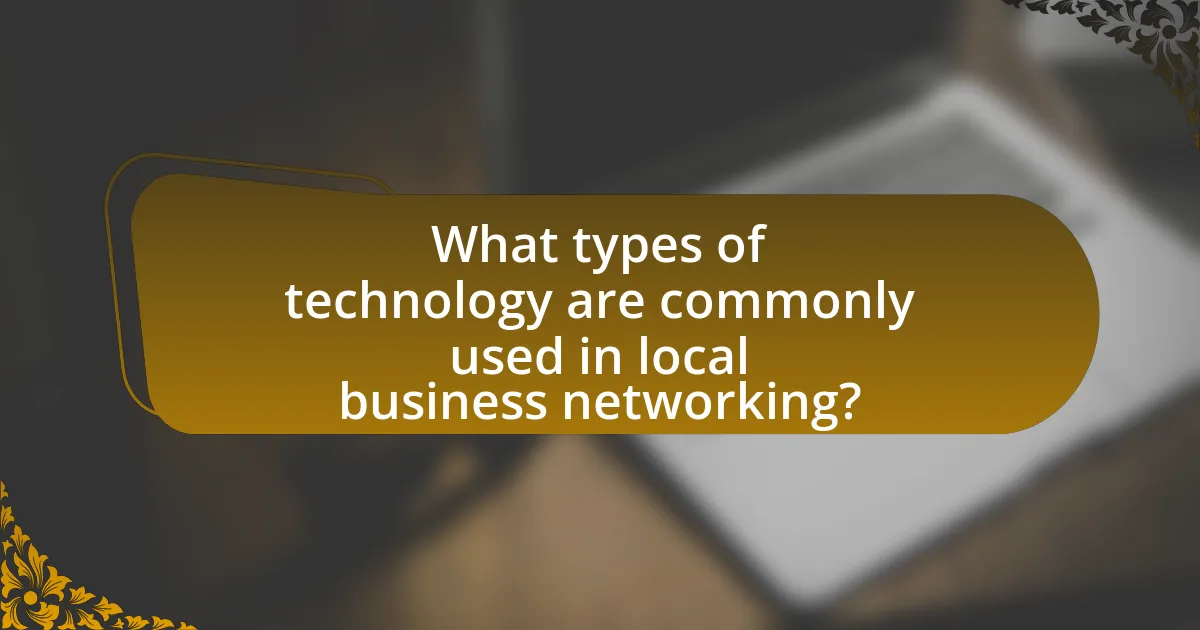The article examines the pivotal role of technology in modern local business networking, highlighting how digital platforms enhance communication, collaboration, and relationship-building among businesses and their communities. It discusses the transformation brought about by advancements such as social media, mobile applications, and cloud-based tools, which facilitate efficient networking and broaden access to potential clients and partners. Key challenges faced by businesses without technology, the benefits of utilizing digital tools, and effective strategies for leveraging social media and networking apps are also explored, emphasizing the importance of technology in fostering local connections and improving operational efficiency.

What is the Role of Technology in Modern Local Business Networking?
Technology plays a crucial role in modern local business networking by facilitating communication, collaboration, and relationship-building among businesses and their communities. Digital platforms such as social media, email, and networking apps enable local businesses to connect with potential clients, partners, and suppliers more efficiently than traditional methods. For instance, according to a 2021 survey by the Small Business Administration, 70% of small businesses reported that social media helped them reach new customers and enhance their networking efforts. Additionally, technology allows for the organization of virtual events and webinars, expanding networking opportunities beyond geographical limitations. This integration of technology not only streamlines processes but also fosters a more interconnected local business ecosystem.
How has technology transformed local business networking?
Technology has transformed local business networking by enabling instant communication and access to a broader audience through digital platforms. Online networking tools, such as social media and professional networking sites like LinkedIn, allow businesses to connect with potential clients, partners, and industry peers more efficiently than traditional methods. According to a 2021 survey by LinkedIn, 70% of professionals reported that they found new business opportunities through networking online, highlighting the effectiveness of these digital channels. Additionally, virtual events and webinars have become commonplace, allowing businesses to engage with local communities without geographical limitations, further enhancing networking opportunities.
What are the key technological advancements influencing local business networking?
Key technological advancements influencing local business networking include social media platforms, mobile applications, and cloud-based collaboration tools. Social media platforms like LinkedIn and Facebook facilitate connections among local businesses, allowing for networking opportunities and community engagement. Mobile applications enhance accessibility, enabling business owners to connect and communicate on-the-go, which is crucial for maintaining relationships. Cloud-based collaboration tools, such as Google Workspace and Microsoft Teams, streamline communication and project management, fostering collaboration among local businesses regardless of physical location. These advancements have transformed how local businesses interact, making networking more efficient and effective.
How do these advancements change the way businesses connect?
Advancements in technology significantly change the way businesses connect by enabling real-time communication and collaboration across various platforms. These technologies, such as social media, video conferencing, and cloud-based tools, facilitate instant interactions and networking opportunities that were previously limited by geographical constraints. For instance, a study by McKinsey & Company found that companies using social technologies to connect with external partners saw a 20-25% increase in productivity. This demonstrates that technology not only enhances connectivity but also improves efficiency in business operations.
Why is technology essential for local business networking today?
Technology is essential for local business networking today because it facilitates efficient communication and collaboration among businesses. Digital platforms enable local businesses to connect with each other and their customers in real-time, enhancing relationship-building and networking opportunities. For instance, according to a report by the Small Business Administration, 70% of small businesses use social media to engage with their community, demonstrating the importance of technology in fostering local connections. Additionally, tools like video conferencing and collaborative software allow businesses to network without geographical limitations, making it easier to share resources and knowledge.
What challenges do local businesses face without technology?
Local businesses face significant challenges without technology, including limited market reach, inefficient operations, and reduced customer engagement. Without technology, these businesses struggle to compete with larger companies that utilize digital marketing and e-commerce platforms, resulting in a smaller customer base. Inefficient operations arise from manual processes that consume time and resources, leading to higher operational costs. Additionally, the lack of technology hampers effective communication with customers, making it difficult to respond to inquiries and feedback promptly. According to a 2021 survey by the U.S. Small Business Administration, 70% of small businesses reported that technology adoption improved their customer service and operational efficiency, highlighting the critical role technology plays in overcoming these challenges.
How does technology enhance communication among local businesses?
Technology enhances communication among local businesses by providing instant access to information and facilitating real-time interactions. Tools such as email, messaging apps, and social media platforms enable businesses to share updates, collaborate on projects, and engage with customers efficiently. For instance, a survey by the Pew Research Center found that 81% of small businesses use social media to connect with their audience, demonstrating the effectiveness of these platforms in fostering communication. Additionally, video conferencing tools like Zoom and Microsoft Teams allow for face-to-face meetings without geographical constraints, further improving collaboration among local enterprises.

What types of technology are commonly used in local business networking?
Commonly used technologies in local business networking include social media platforms, email marketing tools, customer relationship management (CRM) systems, and networking apps. Social media platforms like Facebook and LinkedIn facilitate connections and interactions among local businesses, enhancing visibility and engagement. Email marketing tools enable businesses to communicate directly with their audience, promoting events and services effectively. CRM systems help manage relationships and track interactions with clients, streamlining networking efforts. Networking apps, such as Meetup and Eventbrite, allow businesses to organize and participate in local events, fostering community connections. These technologies collectively enhance the efficiency and effectiveness of local business networking.
How do social media platforms facilitate local business networking?
Social media platforms facilitate local business networking by providing tools for connection, communication, and collaboration among businesses and their communities. These platforms enable businesses to create profiles, share updates, and engage with local customers, fostering relationships that can lead to partnerships and increased visibility. For instance, Facebook and LinkedIn allow businesses to join local groups, participate in discussions, and promote events, which enhances their networking opportunities. According to a 2021 survey by the Pew Research Center, 69% of adults in the U.S. use social media, indicating a broad audience for local businesses to connect with potential clients and partners.
What are the most effective social media strategies for local businesses?
The most effective social media strategies for local businesses include targeted advertising, community engagement, and content localization. Targeted advertising allows local businesses to reach specific demographics within their geographic area, increasing the likelihood of attracting nearby customers. For instance, Facebook Ads can be tailored to target users based on location, interests, and behaviors, which has been shown to improve conversion rates significantly.
Community engagement involves actively participating in local conversations and responding to customer inquiries on platforms like Instagram and Twitter. This strategy fosters relationships and builds brand loyalty, as studies indicate that businesses that engage with their audience see a 20-40% increase in customer retention.
Content localization ensures that the content shared resonates with the local audience by incorporating local events, culture, and language. Research from HubSpot shows that localized content can lead to a 60% increase in engagement rates, making it a crucial strategy for local businesses aiming to connect with their community effectively.
How can local businesses measure the success of their social media networking?
Local businesses can measure the success of their social media networking by analyzing key performance indicators (KPIs) such as engagement rates, follower growth, and conversion rates. Engagement rates, which include likes, shares, and comments, indicate how well content resonates with the audience; for instance, a 2% engagement rate is considered average across platforms. Follower growth reflects the expanding reach of the business, with a consistent increase suggesting effective networking strategies. Conversion rates, which track the percentage of social media interactions that lead to sales or inquiries, provide direct insight into the effectiveness of social media efforts; a conversion rate of 1-3% is typical for social media campaigns. By regularly monitoring these metrics, local businesses can assess their social media performance and make informed adjustments to their strategies.
What role do networking apps play in local business connections?
Networking apps facilitate local business connections by providing platforms for entrepreneurs and professionals to interact, collaborate, and share resources. These applications enable users to discover local contacts, attend networking events, and engage in discussions relevant to their industries. For instance, a survey by LinkedIn found that 85% of jobs are filled through networking, highlighting the importance of these connections in local economies. Additionally, networking apps often include features such as messaging, event calendars, and community forums, which enhance communication and foster relationships among local businesses.
Which networking apps are most popular among local businesses?
The most popular networking apps among local businesses are LinkedIn, Facebook, and Meetup. LinkedIn is widely used for professional networking, allowing businesses to connect with potential clients and partners. Facebook offers local business pages and groups that facilitate community engagement and networking. Meetup enables businesses to organize and participate in local events, fostering connections within specific industries or interests. These platforms collectively support local businesses in building relationships and expanding their networks effectively.
How can businesses leverage networking apps for growth?
Businesses can leverage networking apps for growth by enhancing their connectivity and collaboration with potential clients, partners, and industry peers. These apps facilitate real-time communication, allowing businesses to share resources, ideas, and opportunities efficiently. For instance, platforms like LinkedIn have reported that 80% of professionals consider networking essential for career success, highlighting the importance of building relationships through these digital tools. Additionally, networking apps often provide analytics and insights that help businesses identify trends and opportunities within their industry, enabling informed decision-making and strategic planning.

What are the benefits of utilizing technology in local business networking?
Utilizing technology in local business networking enhances connectivity, efficiency, and access to resources. Technology facilitates real-time communication through platforms like social media and messaging apps, allowing businesses to engage with local customers and partners instantly. Additionally, tools such as video conferencing and webinars enable businesses to host events and meetings without geographical constraints, broadening their reach. According to a survey by the National Small Business Association, 70% of small businesses reported that technology improved their networking capabilities, demonstrating its significant impact on fostering relationships and collaboration within local communities.
How does technology improve relationship building among local businesses?
Technology enhances relationship building among local businesses by facilitating communication, collaboration, and networking opportunities. Digital platforms such as social media, email, and messaging apps enable businesses to connect with each other quickly and efficiently, fostering a sense of community. For instance, a study by the Pew Research Center found that 70% of small businesses use social media to engage with customers and other businesses, which strengthens local networks. Additionally, technology tools like customer relationship management (CRM) systems allow businesses to track interactions and manage relationships more effectively, leading to increased trust and collaboration.
What specific tools can enhance relationship management?
Customer Relationship Management (CRM) software is a specific tool that can enhance relationship management. CRM systems like Salesforce, HubSpot, and Zoho CRM enable businesses to track interactions, manage customer data, and automate communication. These platforms provide analytics and reporting features that help businesses understand customer behavior and preferences, leading to improved engagement and retention. According to a study by Nucleus Research, CRM applications can increase sales productivity by up to 34%, demonstrating their effectiveness in enhancing relationship management.
How can technology help in maintaining long-term business relationships?
Technology helps in maintaining long-term business relationships by facilitating communication, enhancing collaboration, and providing data-driven insights. Communication tools like email, instant messaging, and video conferencing enable businesses to stay connected with clients and partners, fostering trust and engagement. Collaboration platforms allow teams to work together seamlessly, regardless of location, which strengthens partnerships. Additionally, customer relationship management (CRM) systems provide valuable data on client interactions and preferences, enabling businesses to tailor their services and maintain relevance. According to a report by Salesforce, 70% of customers say connected processes are very important to winning their business, highlighting the significance of technology in nurturing long-term relationships.
What impact does technology have on local business visibility?
Technology significantly enhances local business visibility by enabling businesses to reach a broader audience through online platforms. Digital marketing tools, such as social media, search engine optimization (SEO), and local listings, allow businesses to appear in search results and engage with potential customers in their area. For instance, a study by Google found that 76% of people who search for something nearby visit a business within a day, highlighting the importance of online presence for local visibility. Additionally, technologies like Google My Business help local businesses manage their online information, making it easier for customers to find them and increasing foot traffic.
How can local businesses use technology to increase their online presence?
Local businesses can use technology to increase their online presence by leveraging digital marketing strategies, social media platforms, and search engine optimization (SEO). Digital marketing allows businesses to reach a wider audience through targeted advertising, with 79% of consumers stating that user-generated content highly impacts their purchasing decisions. Social media platforms enable businesses to engage directly with customers, fostering community and brand loyalty; for instance, 73% of marketers believe that their efforts through social media marketing have been “somewhat effective” or “very effective” for their business. Additionally, implementing SEO techniques helps local businesses improve their visibility on search engines, with 75% of users never scrolling past the first page of search results, emphasizing the importance of appearing prominently online.
What are the best practices for optimizing local search results?
To optimize local search results, businesses should focus on three key practices: ensuring accurate and consistent business information across online directories, leveraging local SEO strategies, and encouraging customer reviews. Accurate business information, including name, address, and phone number (NAP), should be uniform across platforms like Google My Business, Yelp, and social media to enhance visibility. Local SEO strategies, such as using location-based keywords and creating localized content, help search engines understand the relevance of a business to local queries. Additionally, customer reviews significantly impact local search rankings; businesses with higher quantities of positive reviews tend to rank better in local search results, as confirmed by a study from Moz, which indicates that review signals account for approximately 15% of local search ranking factors.
What are the potential drawbacks of relying on technology for networking?
Relying on technology for networking can lead to several potential drawbacks, including reduced personal interaction, over-reliance on digital communication, and privacy concerns. Reduced personal interaction can hinder relationship-building, as face-to-face communication fosters trust and rapport, which are essential in business networking. Over-reliance on digital communication may result in misunderstandings or misinterpretations, as non-verbal cues are often lost in virtual interactions. Additionally, privacy concerns arise from the sharing of personal information on digital platforms, which can lead to data breaches or misuse of sensitive information. According to a study by the Pew Research Center, 64% of Americans have experienced a major data breach, highlighting the risks associated with digital networking.
What risks do local businesses face when using technology for networking?
Local businesses face several risks when using technology for networking, including data breaches, loss of personal connections, and reliance on technology. Data breaches can expose sensitive customer information, leading to financial loss and reputational damage; for instance, a 2021 report by IBM found that the average cost of a data breach was $4.24 million. Additionally, over-reliance on digital communication can diminish personal relationships, which are crucial for local business success. Lastly, technical failures or cyberattacks can disrupt operations, as evidenced by the 2020 ransomware attack on the city of New Orleans, which highlighted vulnerabilities in municipal networks.
How can businesses mitigate these risks effectively?
Businesses can effectively mitigate risks by implementing robust cybersecurity measures, conducting regular risk assessments, and fostering a culture of compliance. Cybersecurity measures, such as firewalls and encryption, protect sensitive data from breaches, which have increased by 33% in recent years according to the Identity Theft Resource Center. Regular risk assessments allow businesses to identify vulnerabilities and address them proactively, reducing the likelihood of incidents. Additionally, fostering a culture of compliance ensures that employees are aware of regulations and best practices, which can decrease the risk of legal issues and enhance overall operational integrity.
What practical tips can local businesses implement for effective networking using technology?
Local businesses can implement several practical tips for effective networking using technology, including utilizing social media platforms, engaging in online communities, and leveraging customer relationship management (CRM) tools. Social media platforms like Facebook and LinkedIn allow businesses to connect with potential clients and partners, share updates, and participate in discussions relevant to their industry. Engaging in online communities, such as forums or local business groups, fosters relationships and provides opportunities for collaboration. Additionally, CRM tools help businesses manage contacts, track interactions, and streamline communication, enhancing networking efforts. According to a survey by HubSpot, 70% of marketers see increased engagement through social media, highlighting its effectiveness in networking.







































